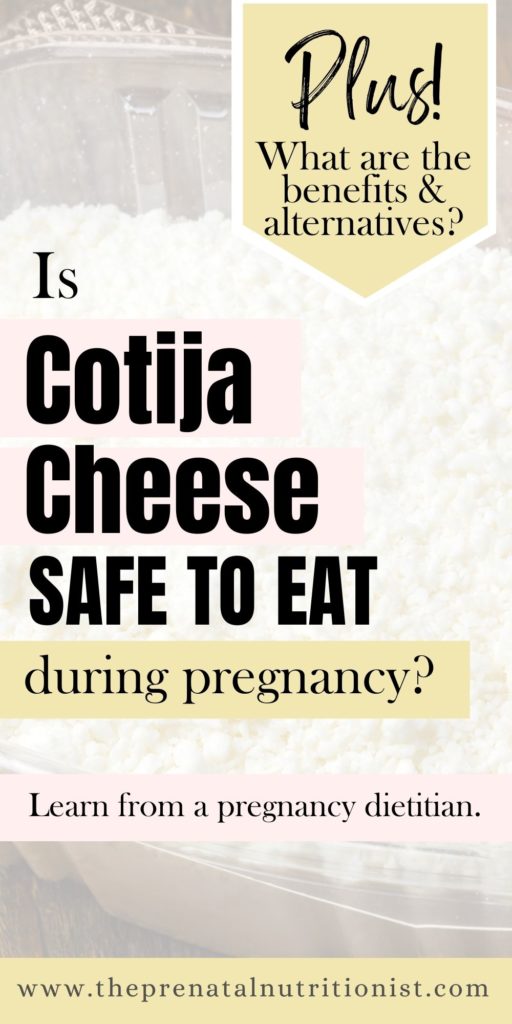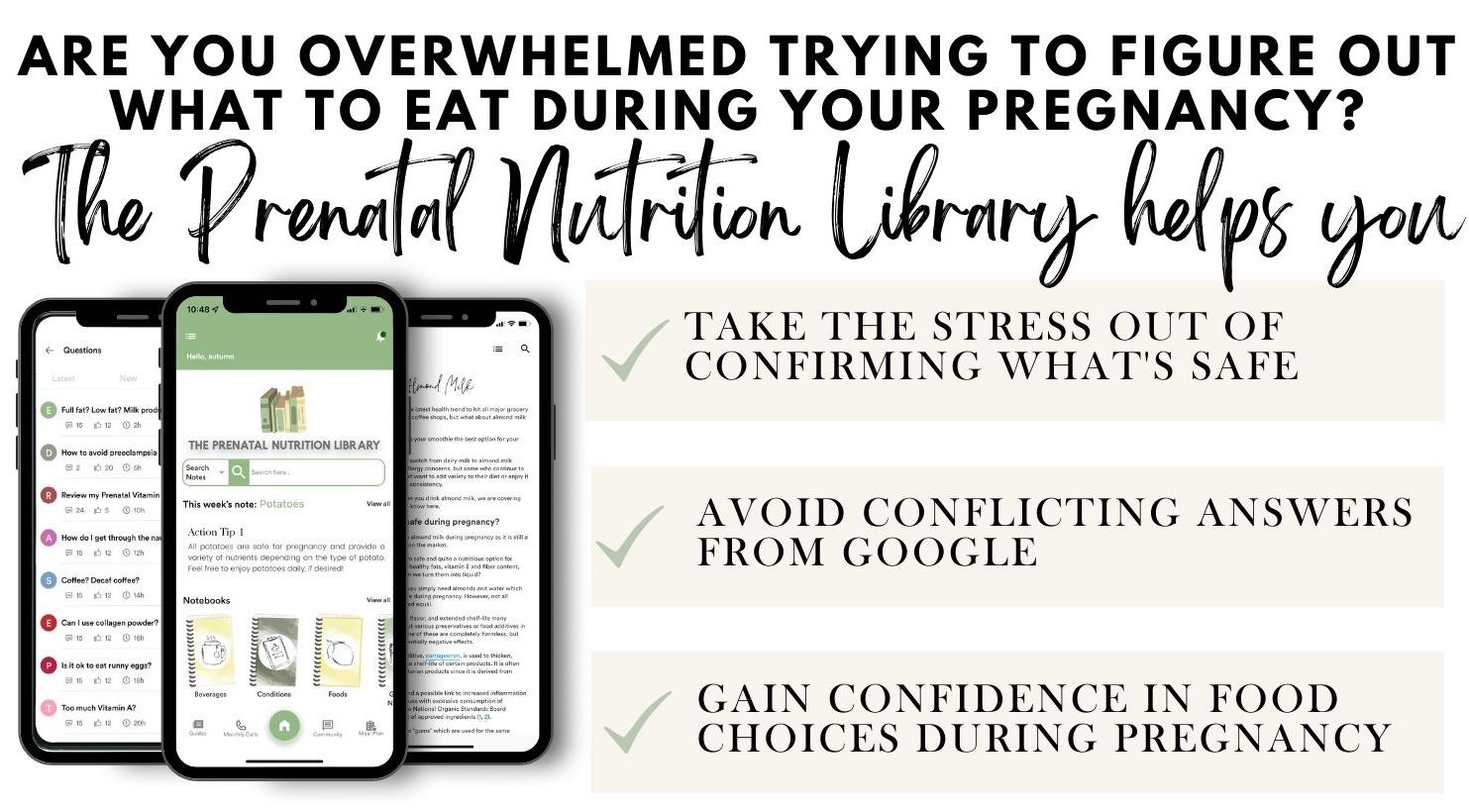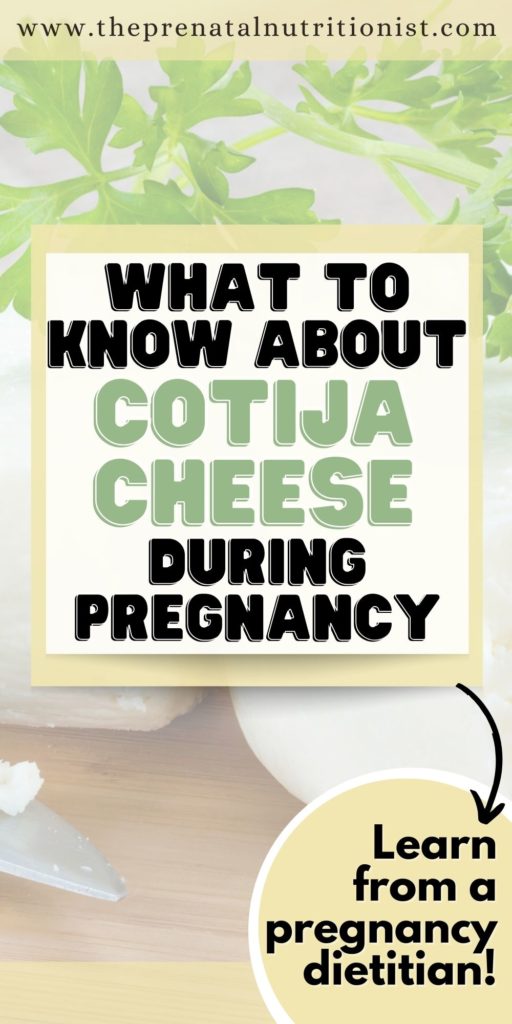
Listen up, beautiful moms-to-be! Today, we’re taking a detour to the land of Mexican cuisine. This cuisine has likely caught your eye (and your taste buds’ attention) and is home to the delicious cotija cheese.
This white, crumbly cheese is made from cow’s milk and packs a seriously addictive, milky, salty flavor that’ll have you saying, “More, please.” Cotija comes in two forms for your snacking pleasure. There’s the fresh cotija cheese with a pillowy soft texture and mild tang and the aged Cotija Añejo, whose firm bite and sharp kick will wake up your taste buds in the best way.
But I know what you’re thinking when it comes to cheese and dairy while pregnant; things can get a little confusing. Many types seem to fall under the “approach with caution” label, thanks to potential food safety risks. I understand the overwhelming feeling that often comes with navigating nutrition during pregnancy; however, know the list of foods to avoid is much shorter than you think!
That’s why I’m dedicating this post to clarify whether eating Cotija cheese when pregnant is safe. Let’s dig in and find out!
Everything You Need to Know About Cotija Cheese in Pregnancy
Pregnancy really does some wild things to our taste buds and cravings, doesn’t it? One minute, you’re living for all the salty, savory flavors; the next, your once-beloved meal makes you nauseous. It’s a full-on sensory circus!
Flavorful cheese like Cotija is a common salty craving among pregnant women. Sometimes, that punch of saltiness is just what we need to make even the blandest meal palatable and satisfying again when our taste buds feel out of whack. We also need more salt during pregnancy, hence why it’s a common craving!
It’s an exciting and flavorful boost to meals. This is why we’re taking the time to examine whether Cotija cheese is safe to sprinkle over enchiladas, tostadas, salads, and more. We aim to provide you with the information to make an informed decision about your pregnancy. Of course, keeping you and that precious little one safe and nourished is the top priority.
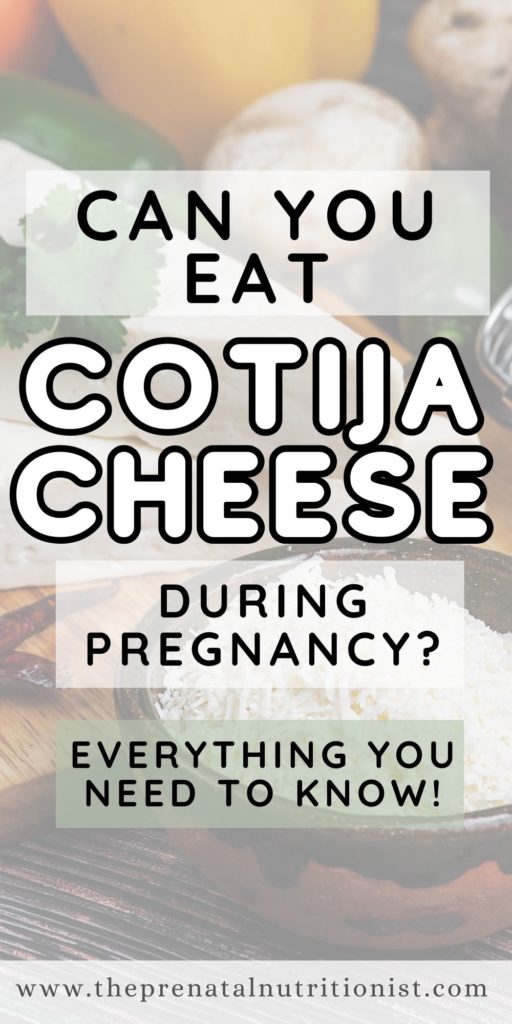
Is Cotija Cheese Safe for Pregnancy?
Pregnant ladies get the green light on hard cheeses and soft cheese varieties clearly labeled “pasteurized.” The pasteurization process is what we look for when picking a cheese during pregnancy. Pasteurization involves heating the milk to kill any potentially harmful bacteria. This greatly helps to reduce the risk of foodborne illness.
The CDC recommends avoiding anything unpasteurized during pregnancy, whether it’s soft cheeses, raw milk, or unpasteurized yogurts. As tempting as the raw, artisanal stuff might be, there’s a slightly higher risk of the potential to be contaminated and contracting foodborne illnesses like listeriosis.
Pregnant women are at increased risk of foodborne illnesses because the immune system is slightly suppressed during pregnancy. Additionally, in the worst-case scenarios, Listeria monocytogenes bacteria can lead to miscarriage, stillbirth, preterm labor, and other pregnancy complications. This does not mean raw dairy will cause foodborne illness; it’s just that there’s an increased risk involved.
Sticking to pasteurized milk and dairy products is the best practice. Cheese can be a nutritious part of a balanced pregnancy diet. It’s packed with calcium and protein to help promote strong bones and healthy growth for your little one. It can also be used in a variety of dishes and snack pairings. Dairy isn’t essential to a nourishing pregnancy diet, but it’s a great addition if you tolerate it.
Now, back to cotija cheese. It is considered safe to eat during pregnancy when made from pasteurized milk. However, it is best practice to avoid cotija cheese made from unpasteurized milk. Many brands in the United States are pasteurized. However, it’s important to note it’s traditionally made from unpasteurized milk, so if it’s from Mexico, it may be unpasteurized.
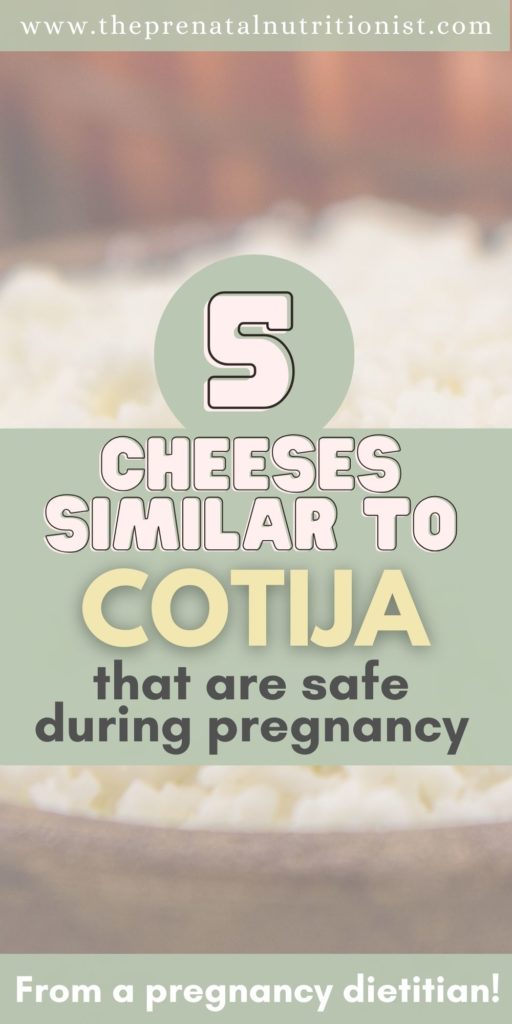
Cotija Cheese Alternatives
When pasteurized, cotija cheese is deemed safe for pregnancy! But it’s nice to vary your choices occasionally and have options. Whether it’s because cotija is hard to find in your area or you’re just looking to switch up the flavors, I’ve got five (5) tasty alternatives for you:
Feta Cheese
Cotija is often compared to feta. Like cotija, this salty Greek cheese comes in varying densities, from dry and crumbly to smooth and creamy. While feta is brined in salt, it’s a tad less salty than cotija. The key difference? Feta is traditionally made with pasteurized goat’s milk, while Cotija comes from cow’s milk. However, feta is commonly made with cow’s milk in the United States, making it comparable to cotija. They’re alike in color, texture, and usually price too.
Ricotta Salata
Don’t get this mixed up with the ricotta cheese you use in lasagna! Ricotta Salata is the same cheese, but it’s been allowed to age and firm up a bit. Texture-wise, it’s similar to Cotija, but the flavor is way creamier and subtly sweet a total U-turn from cotija’s bold saltiness. This one’s a great option if you want that familiar crumbly texture but aren’t feeling Cotija’s punchy flavors any longer.
Pecorino Romano
Pecorino romano is a sheep’s milk cheese with the hard, crumbly texture cotija lovers crave. It is on the saltier side but not quite as salty-tasting as cotija. It works great as a pizza or lasagna topping.
Parmesan
Parmesan is probably already a staple in your kitchen, and it makes an awesome Cotija substitute, too! That slightly nutty, salty kick adds oomph to everything, from pasta to pizza. Tradition parmesan cheese is unpasteurized. However, it’s a hard cheese with low water content, making it an environment where bacteria and other pathogens are unlikely to grow. Also, almost every parmesan cheese found in your grocery store is pasteurized.
Anejo Cheese
Anejo is an authentic Mexican alternative to Cotija, though admittedly, they’re not twins in terms of flavor or texture. Before aging, Anejo gets a coating of smoky paprika, giving it a super unique, almost spicy kick that sets it apart from Cotija. Anejo is made with goat’s milk or cow’s milk. Eating goat cheese while pregnant is also safe when it is pasteurized.
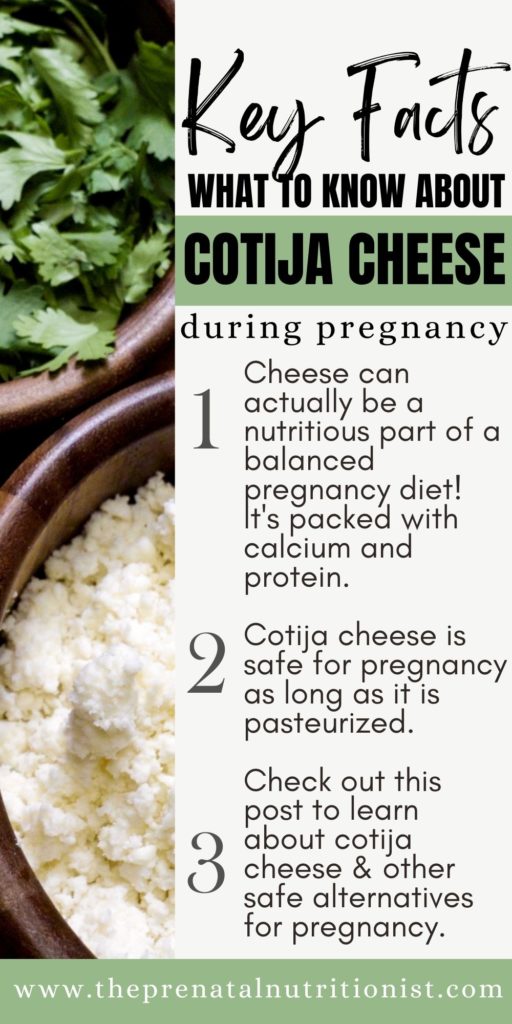
There is a solution to always second-guessing or stressing over every bite you take during pregnancy.
Cotija is a delightful creamy cheese that makes taste buds swoon and satisfies salty pregnancy cravings. When nourishing for two, including this dairy delicacy in your diet is a safe option when pasteurized. But with the dizzying array of cheese varieties out there, knowing which ones are safe or not for you and your baby can feel like a serious head-scratcher.
Let’s be real: making informed food choices during those nine months can feel like an overwhelming task, especially with conflicting advice and outdated tips flying around. That’s where having a trusted resource like The Prenatal Nutrition Library (TPNL) can be a total game-changer.
At TPNL, we provide evidence-based guidance you can truly trust. We’ll break down which foods are safe and which to avoid, as well as important nutrients for pregnancy, taking the guesswork out of navigating nourishment for two. We’ll also provide you with balanced, nutrient-packed meal plans made specifically for each stage of pregnancy, from preconception through delivery.
To get started, download our free 1-week sample meal plan to experience how delicious and energizing your pregnancy diet can be with the right resources!


